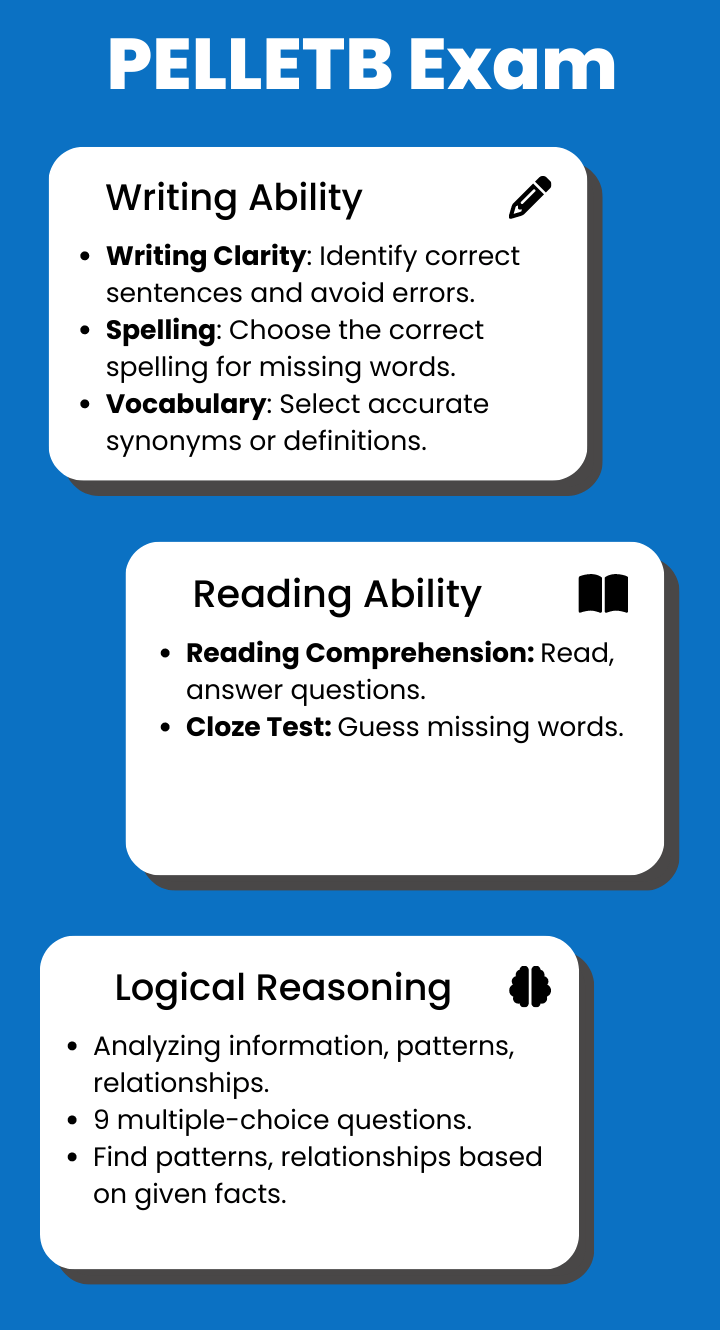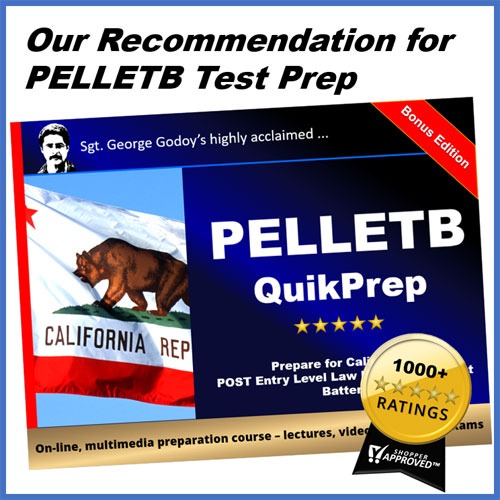
Why the PELLETB Test Matters for Your Career
The POST Entry-Level Law Enforcement Test Battery (PELLETB) is an important test for people who want to become police officers in California. It measures your abilities to do the tasks and responsibilities that come with being a police officer. If you do well on this test, you may be able to go to police academy in California. That’s why it’s important to take this test seriously.
The PELLETB Explained: Scoring, Retakes, and Test Administration
The PELLETB takes about 2 to 2.5 hours to complete. Your test results will be compared to the average score of others who took the test. A T-score of 42-46 is usually good enough to get into most law enforcement academies. But some academies may require higher scores, so check their expectations before you apply. You can retake the PELLETB if you want to improve your score, but there’s a waiting period between retakes. This waiting period is usually 30 days to six months. It’s to keep the test fair and to prevent you from memorizing the content.
You have to take the PELLETB in person at an authorized testing center. This center is usually a law enforcement agency or a related academy. The test is usually free, but some places may charge you a small fee for administrative expenses. Before you sign up for the test, make sure you know about any costs or requirements from the organization that will give you the test.

Understanding the PELLETB Test Sections and Topics
The PELLETB test is an exam with 105 multiple-choice questions.
These are grouped in 3 sections that evaluate your:
- Writing Ability
- Reading Ability
- Logical Reasoning
To become a law enforcement officer, you must do well on each section. Accuracy and speed are both important when answering the questions.
We will examine each of these sections to provide you with a clear understanding of what to anticipate when you undertake the PELLETB test. Going through the example questions and answers below should help you prepare even better.
Writing Ability: Clarity, Spelling, and Vocabulary
The Writing Ability section consists of three sub-sections, each with 15 questions:
- Writing Clarity: This part tests your ability to identify grammatically correct sentences. You will be given two sentences and asked to choose the one that is written correctly. Be on the lookout for common writing errors such as unclear references, misplaced modifiers, sentence fragments, and run-on sentences.
- Spelling: In this sub-section, you will encounter a sentence with a missing word. Four different spelling options will be provided for the omitted word, and you must select the correct one.
- Vocabulary: Here, a word in a given sentence will be underlined, and you need to select the most accurate synonym or definition out of four options.
Here are a few sample questions:
1. Choose the correctly spelled word:
A) Embezzelment
B) Embezelment
C) Embezzlement
D) Embezlement
Correct answer: C) Embezzlement
2. Identify the sentence with correct punctuation and grammar:
A) The officers pursued the suspect, but they lost sight of him.
B) The officers pursued the suspect but they lost sight of him.
C) The officers pursued the suspect, but, they lost sight of him.
D) The officers, pursued the suspect but they lost sight of him.
Correct Answer: A) The officers pursued the suspect, but they lost sight of him.
Explanation: Option A has proper punctuation and grammar. The comma after “suspect” correctly separates the two independent clauses, “The officers pursued the suspect” and “they lost sight of him.” The coordinating conjunction “but” connects these clauses, showing the contrast between the two actions.
3. Choose the word that best fits in the blank:
The detective’s keen __________ allowed him to spot the crucial evidence.
A) perusal
B) observation
C) perspicacity
D) temerity
Correct Answer: C) perspicacity
Explanation: The word “perspicacity” means keen insight, understanding, or mental discernment. In this context, it describes the detective’s ability to spot crucial evidence due to their sharp perception. The other options don’t fit as well: “perusal” refers to reading or examining something, “observation” is a more general term for noticing something, and “temerity” means excessive confidence or boldness.
Reading Ability: Comprehending Texts and CLOZE Test
The Reading Ability section consists of two sub-sections:
- Reading Comprehension: This part contains 20 multiple-choice questions, where you need to read passages about policy or reports and then answer questions related to the content.
- CLOZE Test: This challenging sub-section covers 40 items and involves paragraphs where the first and last sentences are complete, but every seventh word in the other sentences is omitted. You need to guess the missing word, indicated by dashes corresponding to the number of letters in the word. More than one word may fit the context and be accepted as a correct answer.
Sample questions:
1. Read the passage and answer the question below:
“Law enforcement agencies across the country have seen an increase in community-based policing programs. These programs aim to create strong partnerships between law enforcement officers and the communities they serve. By working together, they can identify and address various public safety issues.”
Which of the following best summarizes the main idea of the passage?
A) Community-based policing programs involve partnerships between law enforcement officers and the communities they serve.
B) Law enforcement agencies have found it difficult to implement community-based policing programs.
C) Public safety issues are best addressed by law enforcement officers working independently.
D) Community-based policing programs are ineffective in addressing public safety issues.
Correct Answer: A) Community-based policing programs involve partnerships between law enforcement officers and the communities they serve.
Explanation: The passage highlights that community-based policing programs aim to create strong partnerships between law enforcement officers and the communities they serve. This partnership allows them to identify and address various public safety issues together. Option A best summarizes the main idea of the passage.
2. The officer’s training and experience __________ him to anticipate the suspect’s next move.
A) alluded
B) attributed
C) enabled
D) transcended
Correct Answer: C) enabled
Explanation: In this context, the word “enabled” means to provide someone with the means, knowledge, or opportunity to do something. The officer’s training and experience gave him the ability to anticipate the suspect’s next move. The other options don’t fit the context: “alluded” means to indirectly mention or refer to something, “attributed” means to regard something as being caused by or belonging to someone, and “transcended” means to go beyond the range or limits of something.
Logical Reasoning: Analyzing Information and Patterns
The PELLETB Logical Reasoning Test assesses your skill in analyzing information and identifying patterns, relationships, and ordered series of facts. This section has 9 multiple-choice questions. Your job is to choose the best answer based on the facts given in the text and find patterns and relationships among the information given.
For example:
1. If all detectives are investigators, and some investigators are analysts, which of the following must be true?
A) All detectives are analysts.
B) Some detectives are analysts.
C) No detectives are analysts.
D) None of the above can be concluded.
Correct Answer: D) None of the above can be concluded.
Explanation: Since all detectives are investigators and only some investigators are analysts, we cannot conclude anything about the relationship between detectives and analysts. It is possible that some detectives are analysts, but we cannot be certain.
2. Officer Johnson is patrolling the streets on Monday, Wednesday, and Friday. Officer Martinez patrols on Tuesday and Thursday. If Officer Smith patrols on the days that Officer Martinez doesn’t, which days does Officer Smith patrol?
A) Monday, Wednesday, Friday
B) Tuesday, Thursday
C) Monday, Tuesday, Wednesday, Thursday, Friday
D) No days
Correct Answer: A) Monday, Wednesday, Friday
Explanation: Officer Smith patrols on the days that Officer Martinez doesn’t patrol. Since Officer Martinez patrols on Tuesday and Thursday, Officer Smith patrols on the remaining days, which are Monday, Wednesday, and Friday.
3. Choose the next number in the series: 2, 5, 10, 17, 26, …
A) 33
B) 35
C) 37
D) 40
Correct Answer: C) 37
Explanation: The number series can be understood as the sum of consecutive odd numbers starting from 1:
1 + 1 = 2
2 + 3 = 5
5 + 5 = 10
10 + 7 = 17
17 + 9 = 26
Following this pattern, the next number in the series is 26 + 11 = 37.

PELLETB Practice Tests and How to Prepare
Serious candidates should read the study guide available for the California POST. While this guide gives you a good sample of the types of questions that will be on the exam, it does not provide insight on how to outscore your competition. If you want to get a score that will get you hired, an online course is the way to go.
To gain more confidence and proper knowledge for the PELLETB, it is always better to use an online preparation course. To select the right course, look for the following features:
- Sufficient number of practice questions
- Coverage of all sections of the PELLETB
- Practical guide with answers
- Explanations and tips on how to solve the questions
- Easily accessible 24/7

We highly recommend Sgt Godoy’s PELLETB QuickPrep Course, which fulfills all of the above criteria and is an excellent way to prepare for the test. With Sgt Godoy’s expertise in law enforcement training and a proven track record of success, you can trust that this comprehensive course will provide you with the necessary tools to excel on the PELLETB.

 Joseph Libowsky,
Joseph Libowsky,